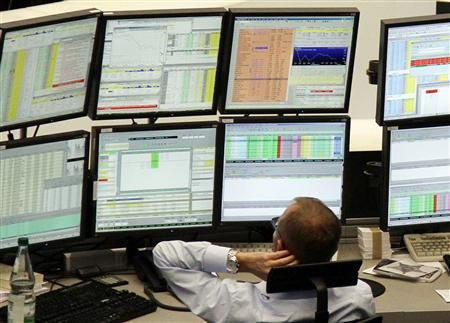Global Stocks Fall as Euro Crisis Saps Confidence

Asian stocks, U.S. index futures and the euro fell Wednesday as investors remained unconvinced that euro zone leaders have a coherent plan to tackle the bloc's sovereign debt problems, which many fear could trigger a new banking crisis.
Global markets have been roiled since the end of July by the twin fears of renewed recession in the United States and Europe's protracted debt woes, which have seen Greece, Ireland and Portugal forced to take bailouts and piled bond market pressure on Italy and Spain.
Some of the European banks may have to recapitalize their balance sheets with government assistance. It's creating a lot of nervousness and uncertainty, said Simon Bonouvrie, portfolio manager at Platypus Asset Management in Sydney.
Oil eased after the International Energy Agency revised down its forecast for growth in consumption due to the struggling global economy.
Underlining the brittle state of confidence in global markets, the dollar rose and the yield on 10-year Japanese government bonds fell below 1 percent as demand for assets perceived as safe havens remained high.
Japan's Nikkei share average <.N225> fell 1 percent, while MSCI's broadest index of Asia Pacific shares outside Japan <.MIAPJ0000PUS> dropped 2.3 percent. <.T>
The MSCI index is now nearly 22 percent below its 2011 high reached in April. A decline of 20 percent or more is the rule-of-thumb definition of a bear market.
U.S. index futures traded in Asia fell 1.1 percent.
Wall Street stocks had risen on Tuesday, with the S&P 500 <.SPX> up 0.9 percent, amid hopes that European leaders would take action soon to ease the two-year-old debt crisis. <.N>
Markets had been spooked in recent days by renewed talk among euro zone policymakers of an imminent default by Greece, prompted by the country's failure to meet the fiscal goals set out in its European Union/IMF bailout.
Greek, German and French leaders were due to hold a conference call at noon EDT on Wednesday.
The conference call will at least calm nerves ... and may provide 24 hours of reprieve. That's about it, though, said Sean Callow, a senior currency strategist at Westpac in Sydney.
The euro slipped to around $1.3625 against the dollar, having jumped more than a cent in the previous session on news of the conference call. The single currency tumbled to a seven-month trough of $1.3499 earlier this week.
Confidence in the euro zone was further dented on Tuesday when Italy, where lawmakers are to vote Wednesday afternoon on an austerity package, was forced to pay the highest interest rates since joining the euro in 1999 to sell 5-year bonds.
Italy is a particular concern because, while Europe's bailout fund can cope with rescuing smaller, peripheral nations, it lacks the financial firepower to save the euro zone's third-largest economy.
Europe's woes drove investors to seek shelter in the dollar, which rose 0.5 percent against a basket of major currencies <.DXY>.
CREDIT FREEZE
The exposure of European banks to sovereign debt has raised fears of a freezing of credit markets in a re-run of the panic that gripped the financial sector after the collapse of Lehman Brothers in late 2008.
Data from the Institute of International Finance this month showed European banks have 3 trillion euros invested in sovereign debt, or 8 percent of their total assets.
In a measure of the alarm in Washington, Treasury Secretary Timothy Geithner will take the unprecedented step of attending a meeting of EU finance ministers in Poland on Friday.
A Brazilian source told Reuters on Tuesday that the BRICS group of big emerging economies was in preliminary talks on increasing their holdings of euro-denominated bonds to help ease the euro zone crisis.
Benchmark 10-year JGB futures gained 0.14 point to 142.71, with the 10-year yield easing 1 basis point to 0.990 percent.
People are hesitant to sell bonds because they think it will be hard to solve the fundamental problems of the euro zone, said a trader at a Japanese bank.
Reflecting the gloomy outlook for the developed world, the Asian Development Bank on Wednesday trimmed its 2011 and 2012 growth forecasts, while noting the region's emerging economies were showing resilience.
Expectations of sagging growth hurt commodities that are dependent on industrial demand, as did the stronger dollar, which makes assets priced in the U.S. currency more expensive for holders of other currencies.
U.S. crude oil fell 1.5 percent to $88.85 a barrel, while Brent crude eased 0.6 percent to $111.27. Copper weakened 1 percent to $8,686.50 a tonne.
Gold eased 0.2 percent to around $1,830 an ounce.
(Editing by Ed Lane)
© Copyright Thomson Reuters 2024. All rights reserved.





















